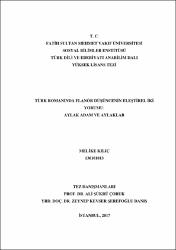| dc.contributor.advisor | Çoruk, Ali Şükrü | |
| dc.contributor.advisor | Şerefoğlu Danış, Zeynep Kevser | |
| dc.contributor.author | Kılıç, Melike | |
| dc.date.accessioned | 2017-03-20T08:16:20Z | |
| dc.date.available | 2017-03-20T08:16:20Z | |
| dc.date.issued | 2017 | |
| dc.date.submitted | 2017 | |
| dc.identifier.citation | KILIÇ, Melike, Türk Romanında Flanör Düşüncenin Eleştirel İki Yorumu : Aylak Adam ve Aylaklar, Fatih Sultan Mehmet Vakıf Üniversitesi Sosyal Bilimler Enstitüsü Türk Dili ve Edebiyatı Anabilim Dalı, Yayımlanmamış Yüksek Lisans Tezi, İstanbul 2017 | en_US |
| dc.identifier.uri | https://hdl.handle.net/11352/2459 | |
| dc.description.abstract | Bu çalışma, modernitenin oluşturduğu tiplerden biri olan aylakların, Türk
romanına etkisini Yusuf Atılgan'ın Aylak Adam ve Melih Cevdet Anday'ın Aylaklar
eserleri üzerinden incelemektedir. Moderniteyle gelen değişimlerin mekâna, zamana,
topluma ve bireye etkisinin ele alındığı ve modernleşmenin, başkenti olan Paris'ten
başlayarak, edebî eserlere ve Türk edebiyatına tesirlerinin irdelendiği tez, aylaklığa
karşı toplumdaki iki farklı bakış açısını ortaya koymaktadır. Paris modernleşmesinin
ardından, modern olana alışma sürecinde ortaya çıkan yeni tiplerden flanörün
aylaklığı, bazı eserlerde modern olana başkaldırı ve bir duruş olarak görülürken, bazı
eserlerde flanörler bir meşgaleye sahip olmamasıyla yerilir. Tez, aylaklığa bakışın
Türk romanında da aynı şekilde teşekkül ettiğini ileri sürer. Bu görüşlerden elde
edilen ise, Türk romanında aylaklık durumunun iki kutbunu gösteren Aylak Adam ve
Aylaklar'ın flanör düşünce ve çalışma felsefeleri bağlamında incelenerek; dönem
romanlarında toplumun yeniye, yeni çalışma tarzlarına, aylaklığa ve mirasyediliğe
olan tavrıdır. Aylak Adam'da aylaklığın bazen bir başkaldırı bazen de toplumun
dışlamasına bağlı olarak bireyin yabancılaşması sonucu ortaya çıkan bir durum
olarak verildiği ve kahramanın aylak olmasının ona ait olumsuz bir durum olmadığı
roman bağlamında açıklanmıştır. Aylaklar romanında ise, birden fazla aylak
karakterin aylaklık durumlarının olumsuz olarak gösterilmekten öte, işsizliğin büyük
bir eksikliğe tekabül ettiği, romana dayanarak ileri sürülmüştür, roman Marks’ın
Fransa’daki başıboşlar için kullandığı ve geliştirdiği lümpen kavramıyla bağlantılar
kurularak değerlendirilmiştir. | en_US |
| dc.description.abstract | This study is an inquiry into flaneries, which is a new figure that emerges
with modernization, and into the ways in which the flaneires effect Turkish novel,
particularly through the novels Aylak Adam, written by Yusuf Atılgan and Aylaklar,
written by Melih Cevdet Anday. The thesis aims to consider the modernization
together with the changes, those to be concerned in relation with the shifts on the
concepts of time, space and individuals. I attempt to analyze how these very changes
influence the Turkish literature, in general, and the Turkish novel, in specific. Having
handled the modernization from its beginnings in Paris, I intend to assert two main
approaches towards the figure of flaneire in societal sense. Inside the adaptation
process that is followed by the Paris modernization, the figure of flaneire is tend to
be considered either as a figure of rebellion, or, it is critized for being lack of the
feeling and the act responsibility. So, the thesis asserts that the main approaches
towards the flaneire is projected into the literature as well as the same. What is
collected as a result of this diversity, I attempt to consider the novels Aylak Adam
and Aylaklar as the two poles of flaneire thought. I intend to comprehend the
adaptation process of modernization, as reflected into the novels Aylak Adam and
Aylaklar with regard to flaneire thought. Following this map, I discuss the ways in
which the society produces to survive in order to adapt what is new, and what is
mainly thought about the figures of flaneire and heir. Based upon the novel Aylak
Adam, it is explained that being a flaneire does not simply signify negativity, but
represents either rebellion or alienation, related to the exclusion by the society. In the
novel Aylaklar, among various representatives of flaneire, the figure is represented
rather than basically being a negative figure, but as a figure in order to highlight the
unemployement as a major deficiency. The novel is mainly evaluated with regard to
the concept of "lumpen" that Marx had created and improved, for those who was
roving in France. | en_US |
| dc.language.iso | tur | en_US |
| dc.publisher | Fatih Sultan Mehmet Vakıf Üniversitesi, Sosyal Bilimler Enstitüsü | en_US |
| dc.rights | info:eu-repo/semantics/openAccess | en_US |
| dc.title | Türk Romanında Flanör Düşüncenin Eleştirel İki Yorumu : Aylak Adam ve Aylaklar | en_US |
| dc.type | masterThesis | en_US |
| dc.contributor.department | FSM Vakıf Üniversitesi, Sosyal Bilimler Enstitüsü | en_US |
| dc.relation.publicationcategory | Tez | en_US |
| dc.contributor.institutionauthor | Kılıç, Melike | |



















